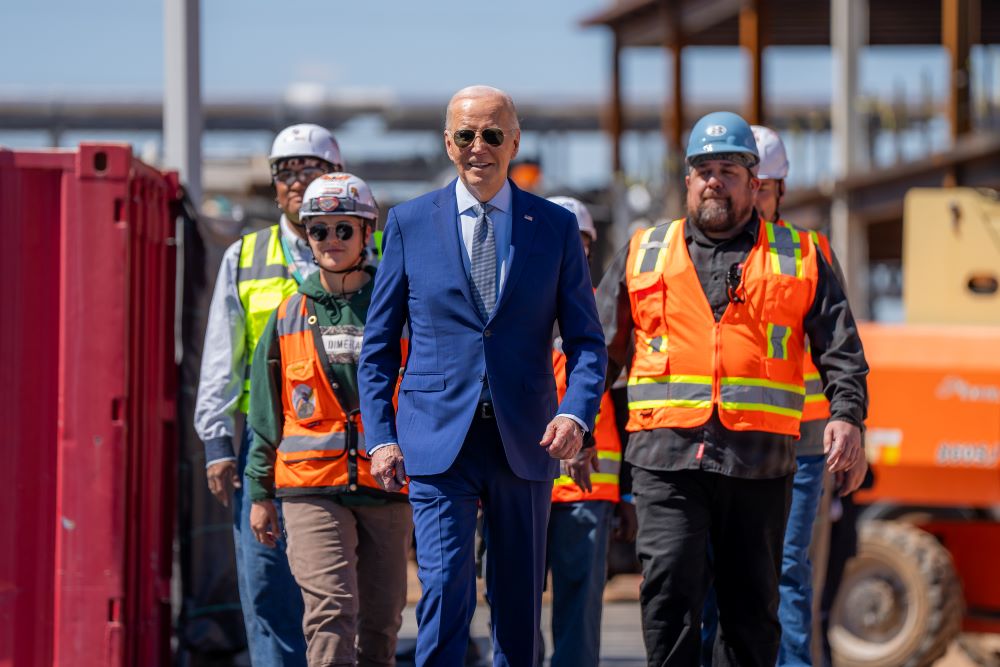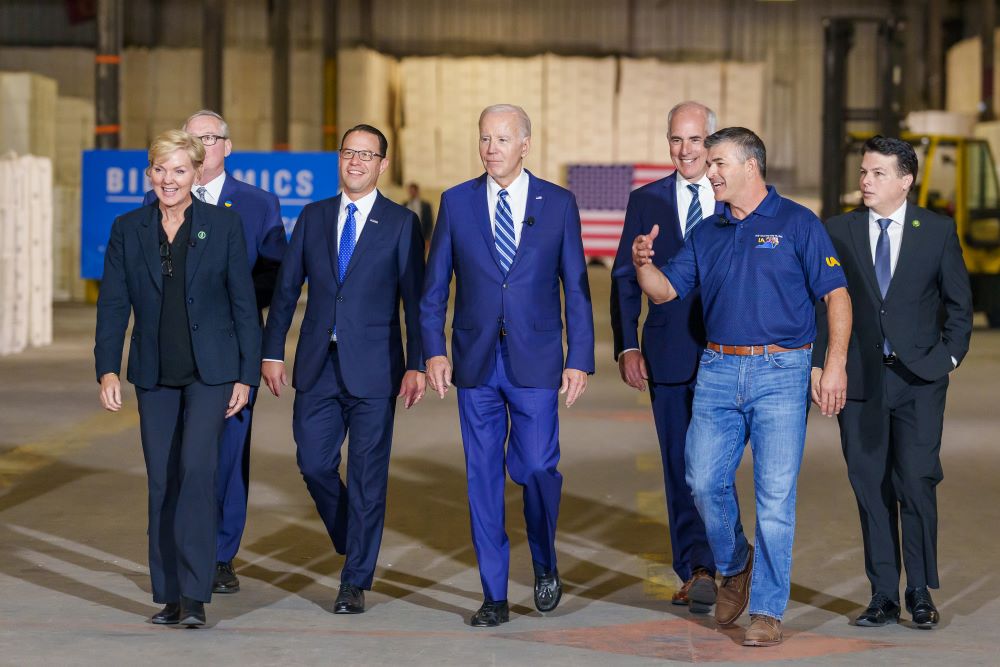
President Joe Biden and union members building Intel's Ocotillo Campus walk onstage before announcing $20 billion in investments to ramp up production of semiconductor chips under the CHIPS & Science Act March 20 in Chandler, Arizona. (Official White House photo/Adam Schultz)
"All politics is local" is one of many bits of proverbial political wisdom that has been overturned in the age of Trump. It speaks to the idea that interests as well as ideas shape the decisions our government makes, and that is not a bad thing; indeed, we have come to understand that the competition amongst interests is one of our guarantors of liberty. The polarization of the country seems to have wiped the idea away.
Not entirely. According to a new poll from Siena College and The New York Times, former President Donald Trump is leading in several swing states — Arizona, Nevada and Pennsylvania — but in those same states, incumbent Democratic senators and one incumbent House member seeking an open Senate seat are leading. In Wisconsin, President Joe Biden is narrowly leading Trump but by only two points.
As the articles note, we are six months away from the election, and there is a lot of room for the polls to change. I take back none of my general reservations about polling. It is far from clear that pollsters have navigated the shift from landlines to cellphones, or that they are adept at modeling the electorate that eventually turns out. Still, these polls correspond more or less to what most of us are hearing from the campaign trail.
The best news for the Biden team is that "Mr. Trump's breakthrough among traditionally Democratic young, Black and Hispanic voters may not rest on a solid foundation," The Times says. "His strength is concentrated among irregular, disengaged voters who do not pay close attention to politics and may not yet be tuned into the race. They may be prone to shift their views as the race gets underway.

President Joe Biden arrives with elected officials before greeting workers at Tioga Marine Terminal Oct. 13 in Philadelphia. From left are Energy Secretary Jennifer Granholm, Mayor Jim Kenney, Gov. Josh Shapiro, Sen. Bob Casey, director of trade for United Association of Plumbers and Pipefitters Anthony Gallagher, and Rep. Brendan Boyle. (Official White House photo/Cameron Smith)
The worrying thing for Team Biden is that the polls have not shifted much since last November, even though the stock market has been posting significant gains and inflation has leveled off. The economy still tops the list of issues for Americans, and they still, foolishly, think that Trump's business credentials hold out hope that he could deliver a robust economy.
The reasons for the disparity have to do with a key fact: Voters do not face a menu of policy options in November. They face a choice amongst candidates. And the incumbent senators are known as local persons, not just as distant politicians in Washington, and voters like what they know. "In Pennsylvania, 23 percent of Republicans viewed [incumbent Sen.] Casey favorably, while only 6 percent had a favorable view of Mr. Biden," The Times noted. Of Nevada's incumbent senator, one voter told the Times, "Jacky Rosen has been around a long time. I think she's a very good Democrat."
The challenge for the Democrats is to judiciously link these popular incumbents, who are seen to be working for the people, with the "return to normalcy" Biden promised but has not been able to deliver. The reason our politics has not returned to normal is because Trump is still the dominant political figure of our time. But, this spring, and in the face of opposition from the former president and the extreme wing of his party, important legislation was passed, such as aid to our foreign allies and a government funding bill.
The adverb "judiciously" is carrying a lot of water in that paragraph above. The incumbents want to win, and running against Washington at a time of intense dissatisfaction among the electorate is the easiest route to electoral victory. Casey's ad, which features workers saying "Our own government turned their backs on us" by using imported steel, may be effective in highlighting Casey's successful effort to include a "buy American" provision in the infrastructure bill, but it undermines the Democratic Party's image as the party that fights for working-class people and, in this case, did so effectively. Such ads are unhelpful.
Advertisement
Democrats need to praise House Speaker Mike Johnson and his willingness to get things done. It costs these incumbents nothing to say, "I disagree with Speaker Johnson about a whole host of issues, but when he has stood up to the extremists in his own party, we have finally been able to get things done for the American people. The Republicans in the House and the Democrats in the Senate worked together. We did not get everything we wanted and neither did they, but we found a way to work together and send legislation to the president's desk. And that legislation is helping right here in [insert name of the town where there is an infrastructure project], putting people to work."
This pitch won't work with those who think the country is such a mess that it is time to blow things up. But nothing will work with them.
The Biden team also needs to craft a series of events and ads that show the president talking with real people. Biden is not allergic to working-class voters. His empathy is one of his most endearing and enduring qualities, as a man and as a politician. Voters in Pennsylvania need to see how Biden is like Casey, and voters in Nevada need to see how he is like Rosen, etc.
Doris Kearns Goodwin, the celebrated historian, likes to recount the story of Franklin Delano Roosevelt's funeral. A man was overcome with emotion as the cortege passed by. Someone asked him, "Did you know the president?" He responded, "No, but he knew me." Biden has to demonstrate that he knows the working men and women of this country. And his fellow Democrats, running for reelection to the Senate, can help him do so.








